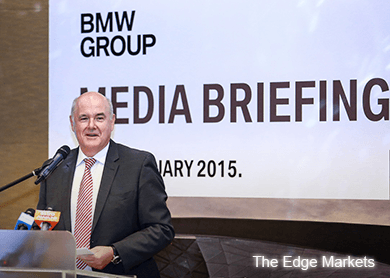

KUALA LUMPUR: BMW Group Malaysia is in talks with the government to establish an export hub here targeting the Asean region, said managing director Alan Harris.
The proposed export hub is “part of the possibilities” for the company here going forward, which Harris hopes will receive a “positive” response from the government in the first quarter this year.
“We have been in strong negotiations with the government over the possibilities there are for us going forward. Those negotiations are not yet finalised, [but] suffice to say, I am very excited about what we have put on the table and I am very hopeful that we would get a positive response from the government,” Harris told a media briefing yesterday.
However, he could not disclose details of the proposed export hub because of the ongoing discussions with the government. Nevertheless, Harris affirmed BMW’s commitment to the local automotive industry with a desire to introduce “as many local energy efficient vehicles [as possible]” here.
Harris, who is also BMW chief executive officer, also said BMW cars will not be more expensive after the implementation of the goods and services tax (GST).
And contrary to popular opinion, they will not be cheaper by 4% either once the 6% consumption tax replaces the 10% sales tax.
“There was a lot of speculation that the 10% sales tax would be replaced by the 6% GST. Some people still have this perception that it will be 4% cheaper, but that is actually not the case,” he said.
“So, until all those calculations are finalised, my anticipation of prices would be the same or marginally cheaper — not more expensive and not 4% cheaper,” he said.
He said prices of its vehicles would be firmer in April once the car manufacturer finalised its pricing strategy, which would also factor in the weaker ringgit.
“Just like any importer, the depreciating currency (ringgit) has an impact on us,” he said.
Harris expects BMW to see sales growth this year, despite acknowledging that the motor vehicle company may face a challenging first quarter due to the imposition of GST.
He said growth would stem from the introductions of the BMW 2-Series Active Tourer, its 3-Series models and some “surprises later this year”.
“We have some significant product introduction during the year and therefore our expectation is that we will still see growth in 2015. It should be another record year,” he said.
Harris was also optimistic that the intense competition in the luxury segment would not dampen growth but instead spur BMW’s further growth in the country.
He said BMW may install a new line or introduce more production shifts at the Kulim plant to expand its current production utilisation capacity of about 70% to 80%.
Last year, BMW car sales hit a new record with a 13.4% growth to 9,046 vehicles as compared with 7,974 vehicles in 2013. The vehicles sold comprised 7,808 BMW, 655 Mini and 583 BMW Motorrad vehicles.
Harris said the strong demand for the variants of the BMW 3-Series and the BMW 5-Series was a “key reason” for its outstanding sales performance last year, and that the introductions of the new BMW, Mini and Motorrad models also helped.
This article first appeared in The Edge Financial Daily, on January 27, 2015.